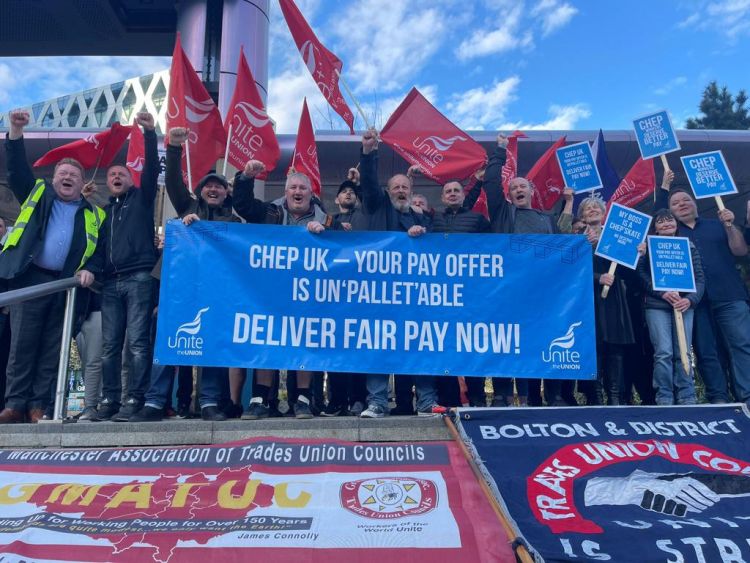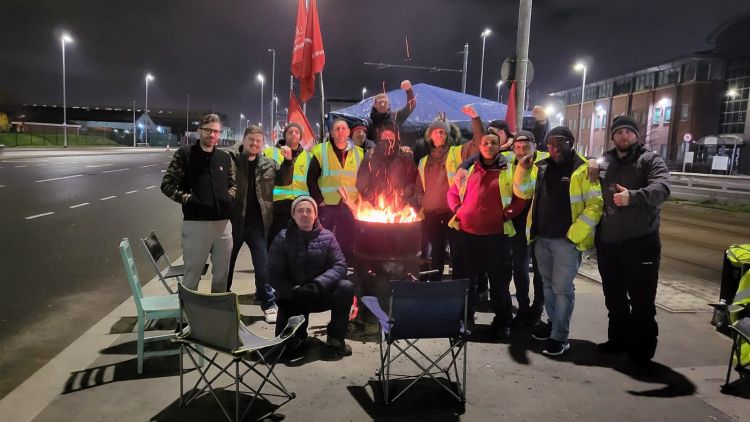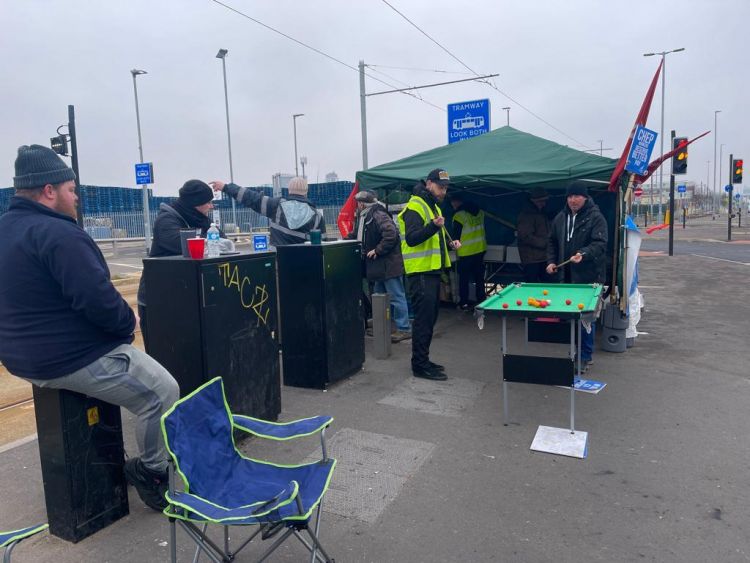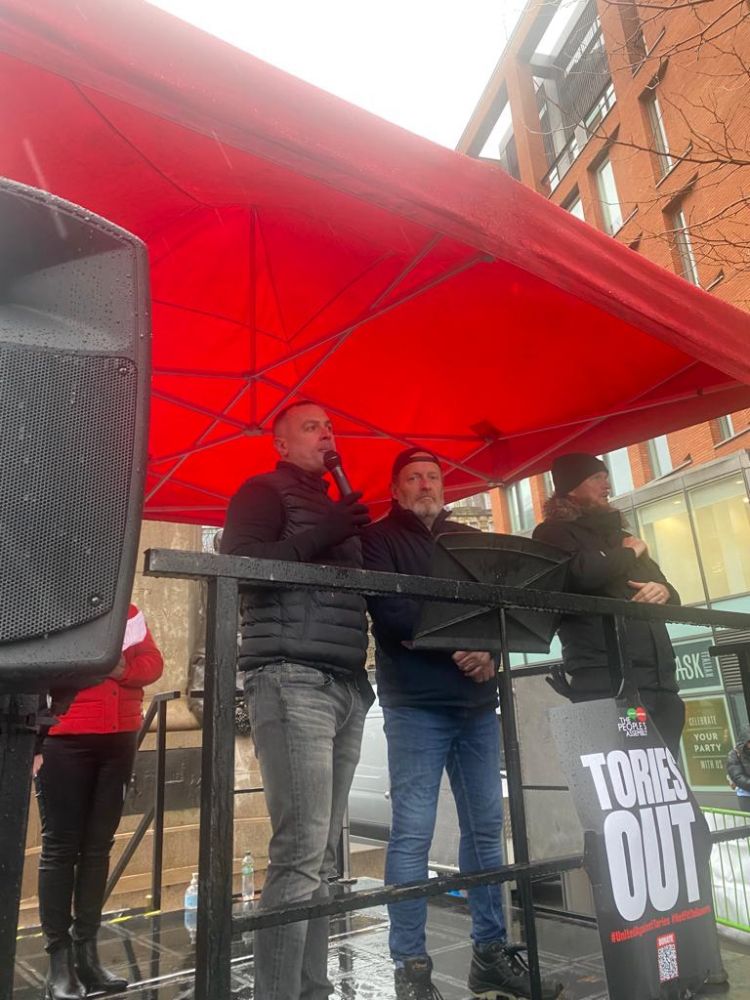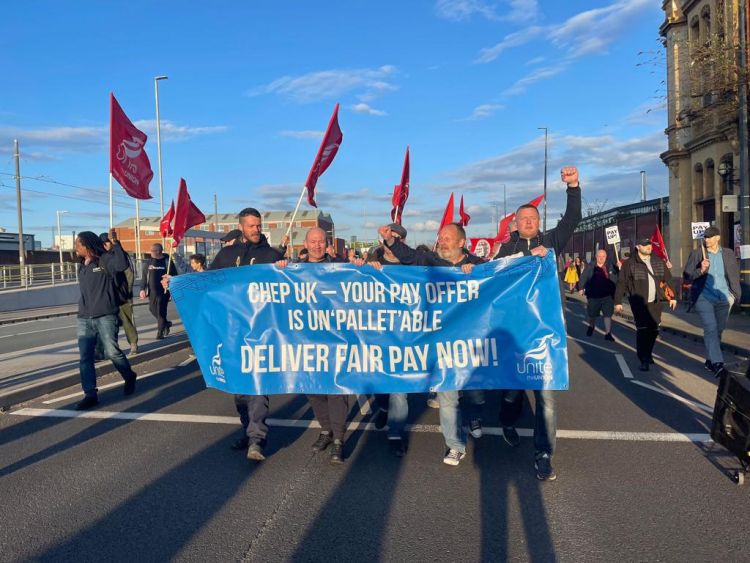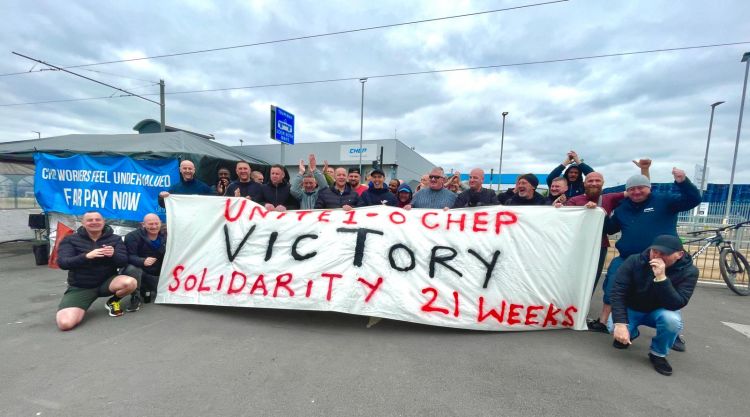Seven steps to strike success
When the pandemic hit, Gary and his colleagues were classed as key workers. Their employer CHEP supply and maintain the transport pallets that keep goods moving around the country, critical to thousands of businesses.
Many felt fearful about going out to work when everyone else was being told to stay at home - but CHEP reassured them that it would be worth it.
“They were telling us that if we could just get through this uncertain time, there’d be a sort of pot of gold at the end of the rainbow,” says Gary.
Thanks to their workers’ courage and hard work, CHEP thrived through the pandemic. But you wouldn’t have known it from 2021’s pay talks.
“What they were offering was a backward step. It was worse than the previous year,” says Gary. “You sit there and think - excuse my language - ‘Are you taking the piss?’ That's when anger really started running through the depot. People started saying, ‘Enough’s enough.’”
It wasn’t an easy decision to strike. Workers were divided, with some understandably reluctant to lose out on pay. “But in the end it was the anger that carried us over the line,” says Gary. “And I was a firm believer that it would be a quick strike.”
It wasn’t a quick strike – but it was a successful one. Below we’ve outlined seven steps to victory.
1. Tools down at midnight
On 3rd December 2021, Gary finished his shift at 10pm and nipped home to change into warm clothes and pick up supplies: food, drink, chairs and a gazebo. He then headed back to CHEP. The night shift had started at 10pm. At midnight, the night workers downed tools and walked out.
Gary and a few of his colleagues were waiting for them on the newly assembled picket line. Apart from freezing cold, how were they feeling?
“It was all a bit surreal,” says Gary. “It’s all new and exciting because you’re entering unchartered territory. I’m a seasoned picketer now, so I look back at the early days and I chuckle to myself. We didn't have a clue what we were doing. We must’ve looked like a right bunch of amateurs!”
2. Location, location, location
Any lack of experience was more than made up for by the strikers’ location outside CHEP.
The picket was just off the main road running through Trafford Park, about half a mile from the Man United ground. Every 20 minutes, the busy tram service to the city centre ran right in front of the picket. Passengers got a great view of the banner and signs provided by Unite, which read CHEP, YOUR PAY OFFER IS UN-PALLET-ABLE and MY BOSS IS A CHEP-SKATE.
Lorries roared past and the wind blew hard, giving the strikers’ gazebo a battering. But, says Gary, “We couldn’t have picked a better location for publicity – it was brilliant.”
3. Overwhelming solidarity
Support came thick and fast. On day one, staff from St Antony’s Community Centre across the road offered their toilets, kitchen and tea and coffee on tap. “Kevin from St Antony’s is a trade unionist and the support he gave us was absolutely fantastic,” says Gary.
Supporters turned up at the picket daily. They dropped off doughnuts and cakes. One woman pulled over to tell the strikers that her late dad had been part of the miners’ strike and would have been proud of them. A lorry driver who’d reluctantly crossed the picket came back later with lager, vodka and snacks. Tracey Scholes, the Manchester bus driver who’d famously won her own dispute at work, showed up with a box of beer and told the strikers to stay strong. All the while, cars, lorries and trucks honked and hooted.
Gary is still in awe of the response. “It was unbelievable, the support we were getting. Loads of people turned up from different trade unions. Looking back, it makes sense that other unions would want to get behind us. But at the time I didn’t really know how big it was going to get. It was huge.”
The solidarity between the workers was something special too. “The camaraderie that the strike fostered, you couldn't have got that inside the depot,” says Gary. “Management had gone and created the best team spirit building exercise that could ever have happened!”
Gary’s advice for others considering action
“First and foremost, I'd say don't be afraid. Don’t believe the propaganda that you can’t win. Be willing to be patient. If you believe you’re worth it, just hold your nerve.”
4. Democracy and darts… and Debussy
The strikers were out on Mondays and Fridays for the first two weeks. Then they stepped things up, picketing five days a week, 24 hours a day. The strikers stuck to their usual shift patterns but it wasn’t long before standing around for eight hours in the middle of a Manchester winter threatened to take its toll.
As lead picket supervisor, Gary had to keep morale high. He set up a rota and cut the shifts on the picket from eight hours to four. But he had to tread carefully.
“I didn’t want to start acting like the boss, because if you have a top-down approach you’re going to lose support. You don’t want the picket to start turning into a chore, because before you know it, the picket could break. So you had to strike a balance.”
If the strikers ran out of chat, they could entertain themselves with card games, a fold up snooker table and a dart board. They had BBQs and played music. Was there a strike theme song? Gary can’t name any standout tracks. But what does stick in his mind is discovering that one of the night workers was a classically trained pianist.
“This guy Stepan – he’s from the Czech Republic – he brought his piano-keyboard down and played for us at about one in the morning. We sat there listening with the fire going. The stuff he could play was unbelievable. Why he’s working at our place with that kind of talent, I don’t know!”
5. New skills and new people
Gary suddenly found himself at the heart of the union movement, getting what he calls ‘a crash course in strikes and trade unionism.’ Does he think he developed new skills?
One hundred percent, says Gary. He’d never been one for public speaking (“No chance. Absolutely not.”) but now his voice was in high demand. He even found himself standing up in front of thousands of people at a cost-of-living demo in Manchester’s Piccadilly Gardens.
“To be brutally honest, I didn’t want to do it,” says Gary. “But someone from the union who I like and respect asked me, so I stepped up. It was nerve wracking, but once I started I just sort of found my voice. I focused in on a certain section rather than looking at the massive crowd. And the response was fantastic.”
Another highlight of the strike for Gary was meeting new people. “I spoke at an NEU branch meeting and I ended up sat round a table with people I genuinely wouldn’t sit around in a table with in my day-to-day life. It was brilliant.”
6. A game-changing rally
Gary was wrong about a quick strike. Twelve weeks came and went. Unite’s legal team got an extension for the workers to stay out for another 12. Meanwhile, offers were made and refused. The workers started contemplating striking for yet another 12 weeks, which would take them into the summer – one of CHEP’s busiest periods.
“We walked right down the middle of the road with our banners and stopped all the traffic,” says Gary. “With the company seeing that and it being all over social media as well, I think they realised we were prepared to go for another 12 weeks. We weren’t willing to back down at all.”
The rally happened on a Wednesday evening in April, 21 weeks into the strike. The next day, CHEP management contacted Unite to arrange a meeting. The day after that, Gary sat in the meeting, looked at the offer on the screen and knew that the strikers had won.
His euphoria was tinged with a sense of anti-climax. “I was sad to put the strike to bed in a way. But you can’t just stay out on strike because you enjoy it, can you? We’d climbed the mountain – we’d got what we came out for.”
7. 100% support from Unite
Gary admits that ‘What’s the union ever done for us?’ is a phrase that once lurked around the CHEP factory floor. Not anymore.
“Unite have been brilliant,” says Gary. “They supported us all the way through it. Sharon Graham [the General Secretary] rang me up a couple of times and said, “Whatever you want, you'll get. You call the shots on this and we'll support you 100%.”
Back in 2020, when Gary became the Unite rep and attended the initial pay talks, he realised he didn’t have the skills and experience to take on the company. That’s when he called on Ian, the Unite officer.
“When Ian came in, he was absolutely fantastic. It was his drive, his passion, his expertise and his belief that made the difference. He knew what we were worth.”
Gary says that there’s been a sea change in how the workers see the union – a revolution even. “But Unite aren’t in the workplace day-to-day. So it’s us as a group that needs to drive the change.”

